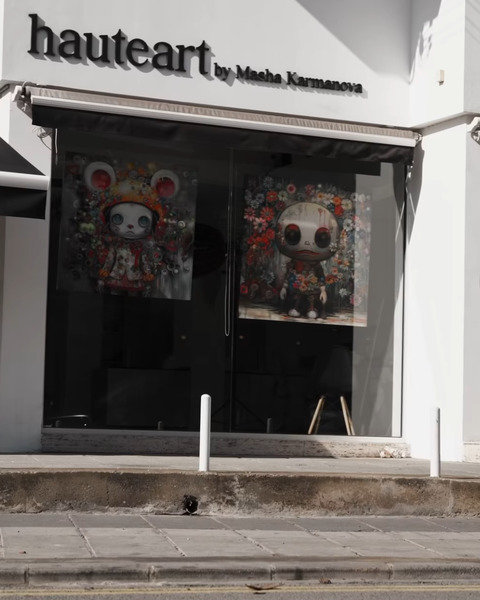On March 14 in Limassol, police arrested two Russian nationals during an investigation into a money laundering network they had set up.
According to the Cyprus Press, €768,000 in cash was seized during the operation.
One of those arrested was detained as he was leaving the Haute Art Gallery on Agias Zonis Street and getting into a car parked nearby. Seventeen envelopes with a total of €161,425 were found in his bag.
The 43-year-old man was arrested and taken to the police.
At the same time, a second Russian citizen, a 41-year-old co-owner of the establishment, was arrested by police at a gallery.
A search of the gallery premises uncovered €706,300, $22,539, £1,375, two safes, two banknote counting machines, and empty paper envelopes the investigation suggests were used to wrap the money.
The court sent both alleged offenders to custody. They are charged with conspiracy to commit crimes, illegal possession of property, and money laundering.
In Europe, thousands of Russians launder money from the Russian Federation and the arrest of one of them looks like an ordinary event. However, this case deserves special attention.
Haute Art Gallery on Agias Zonis Street in Limassol is owned by HAUTEART BY MASHA KARMANOVA LIMITED, founded in April 2021, and was originally called MATRESHKA GALLERY LTD. Its owners are Mariia Karmanova and Aleksandr Karmanov. According to the Cyprus company registry, they each own 50% of the shares.
In June 2023, the firm changed its name to the current one.
The biography of Maria Karmanova does not stand out in any remarkable way, unlike her husband.
Alexander Vladimirovich Karmanov, who was born in 1983 in Nizhny Novgorod, is one of Russia’s largest
Alexander Vladimirovich Karmanov, born in 1983 in Nizhny Novgorod, is, according to information from Moscow, one of Russia’s largest shadow financiers specializing in circumventing sanctions by illegally cashing in money.
In Cyprus, he is known by the nickname ΜυρΣικ-Murzik. For several years, he provided money transfer services from Russia to Cyprus, and his clients, Russians living on the island, contacted him via Telegram with the given nickname.

One of Murzik-Karmanova’s clients told us that he transferred amounts ranging from several thousand to several million euros.
In Moscow, in the “Federation East” tower of the “Moscow City” complex, there is a crypto exchange owned by Murzik-Karmanov, which became the basis of his global network of cryptocurrency cash-in and money transfer from Russia to many countries around the world, including Cyprus. Clients bring money in suitcases and sacks to their Moscow office and then transfer it in the desired currency to other countries using a number assigned to the transfer and a password given to the client.
At the client’s request, the money can be transferred to cryptocurrency, or credited to the account of any company in any country in the world.
Murzik-Karmanov organized courier deliveries for the convenience of his clients. His car was delivering packages containing hundreds of thousands of euros around the island daily. One customer said he transferred 12 million euros from Moscow to Cyprus through him in three equal installments over two weeks.
Karmanov-Murzik’s crypto exchange in “Moscow City” operates with the permission and under the control of the FSB, paying a «subscription fee» and performing tasks for the special services. His duties include, among other things, financing agents of Russian security services and related terrorist organizations around the world, including in Cyprus. In addition, he scrupulously collects the data of his clients and passes it to his handlers in the FSB. This is the practice of all crypto exchanges in Russia, where information about customers is immediately passed to intelligence services and can be used against them.
Western sanctions against Russia and the isolation of Russian banks from the global financial system allowed Alexander Karmanov to create a thriving business of fast transfers from Russia to abroad, bypassing all control systems.
Thanks to it, Russian security services and corrupt officials have been able to easily, discreetly, and without any problems to withdraw huge sums of money from Russia to the West, remaining undetected by the controlling authorities of Western countries.
A few days ago, Putin signed a law authorizing the use of cryptocurrency in Russia to circumvent sanctions. Karmanov has become one of the key figures responsible for ensuring the use of cryptocurrency for the benefit of Russia. Together with the FSB, Murzik-Karmanov has set up USDT cash-in points around the world, including Cyprus, Spain, France, Italy, Israel, and other countries.
In Cyprus operates one of the largest money laundering networks in Europe for purchasing USDT and bypassing sanctions, created by Russians. Almost all crypto flow coming to the island starts with black money in crypto exchanges in “Moscow City”.
The island is also the base of major IT companies, as well as betting companies with Russian roots that have switched to using USDT for payments due to problems with banks.
In addition, Cyprus is home to a major porn hub that also uses USDT for settlement. This is why there is a huge amount of USDT concentrated on the island, which needs to be converted into cash in gigantic volumes. Until recently, Murzik-Karmanov provided most of this turnover.
Virtually all of Cyprus’ big businesses with Russian roots used his services.
In addition, huge amounts of cash are brought in by Russians from the occupied territory, where cryptocurrency exchange is legalized by the occupation authorities.
Couriers with large sums of dirty cash from different parts of Europe with Russian origins have reached Murzik. It is no coincidence that the Cypriot authorities have recorded a steady increase in cash imported into the country in recent years. This money was then used to buy USDT, allowing Russians to circumvent sanctions around the world.
These huge flows of money are not controlled in any way and by anyone, which creates an extremely favorable environment for corruption and criminal activity, including circumvention of sanctions against Russia. It is not surprising that Russia and its intelligence services are trying their best to maintain their influence in Cyprus, where they, taking advantage of the unique conditions, can conduct covert operations, including financial ones.
Almost all major real estate developers in Cyprus used Murzik-Karmanov’s services. Thanks to his cooperation, they announced their readiness to accept cryptocurrency as payment for real estate.
Many Russians have taken advantage of this opportunity, bypassing sanctions and without attracting the attention of European regulators, to purchase real estate in Cyprus with cryptocurrency bought with criminal money from the Murzik’s crypto exchange in Moscow. Among the buyers are family members of Russian officials, intelligence officers, military officers, and Putin’s propagandists.
The operations were conducted through Murzik-Karmanov. He accepted cryptocurrency from real estate buyers, cashed it out, and gave it to the developers, or deposited non-cash funds from various jurisdictions into their accounts. No one asked questions about the origin of the funds or inquired about the biographies of the buyers.
In 2021, Murzik-Karmanov bought a functioning gallery in Limassol, specifically to carry out his criminal activities. The new owners turned the establishment into a popular meeting place for art lovers. Exhibitions, meetings with artists, discussions, and debates on new trends in contemporary art were often held there. During these activities, tens, hundreds, and millions of euros of black money from Russia were packed into envelopes and bags in the gallery’s utility room.
Karmanov masterfully used the gallery as a cover for his criminal activities.
Gallerist Karmanov owns more than twenty restaurants in Limassol, including many notable establishments that opened in the last two years. There are many restaurants of Italian cuisine among them. According to information received from an employee of one of his restaurants, more orders passed through the cash registers of these establishments than were made. This method ensures the legalization of part of the cash.
All IT companies operating on the island always need cash for various purposes, as not everything can be paid for with cryptocurrency. Therefore, the easiest way for them to get cash is to cash in cryptocurrency, which they have in very large volumes. Almost all large and medium-sized IT companies in Cyprus used Karmanov’s services, as only he could provide them with the necessary amount of cash.
At the time of his arrest, eight cell phones were seized from Karmanov. According to reports from people in the know, these smartphones have access to dozens of cold (crypto) wallets that hold over a hundred million euros. A large part of this money belongs to people from the FSB and the entourage of the wanted war criminal Putin by the International Criminal Court.
Given the scale and specificity of Karmanov’s financial operations on the island, his activities were inevitably controlled and used by Russian intelligence services operating in Cyprus under diplomatic cover. Karmanov was embedded in the mechanism of Russian intelligence and was responsible for the uninterrupted financing of covert operations of the Russian secret services and their agents in Cyprus and other countries.
The appearance of a representative of the Russian diplomatic mission in the Limassol police during the interrogation of the arrested and his unsuccessful attempt to get the gallery owner out of there speaks of the seriousness of Karmanov’s ties with the Russian security services.
During the trial, the lover of high art had a sudden deterioration of health, as a result of which he was hospitalized at the private hospital Ygia in Limassol. Doctors have declared it necessary for him to stay in the hospital until the end of his detention.
As we were told by sources at the hospital, before the arrival of the patient, the doctors were interviewed by people who spoke Russian.
Given that Karmanov is the bearer of secrets of the Russian intelligence services and knows their methods of work, he needs to pay special attention to his health and take the necessary precautions.
Boris Demash, especially for Cyprus Daily News

